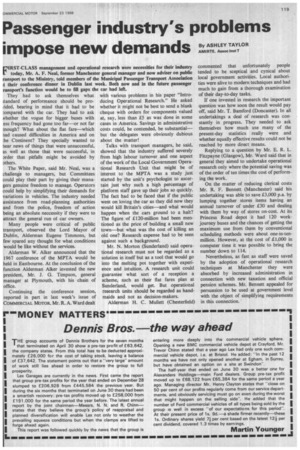Passenger industry's problems impose new demands
Page 121

If you've noticed an error in this article please click here to report it so we can fix it.
By ASHLEY TAYLOR AMIRTE, Assoc InstT
FIRST-CLASS management and operational research were necessities for their industry today, Mr. A. F. Neal, former Manchester general manager and now adviser on public ransport to the Ministry, told members of the Municipal Passenger Transport Association Lt their conference dinner in Dublin last week. Both now and in the future passenger ransport's function would be to fill gaps the car had left.
They had to ask themselves what ;tandard of performance should be pro Tided, bearing in mind that it had to be :ompared with the car. They had to ask whether the vogue for bigger buses with ess frequency had gone too far—or not far mough? What about the flat fare—which tad caused difficulties in America and on the Continent? They specially wanted to tear news of things that were unsuccessful, as well as those that were successful, in arder that pitfalls might be avoided by others.
The White Paper, said Mr. Neal, was a challenge to managers, but Committees could play their part by giving their mana gers genuine freedom to manage. Operators could help by simplifying their demands for variations in vehicles. The industry needed assistance from road-planning authorities and from the police, freedom of action being an absolute neccessity if they were to attract the general run of car owners.
Many people were critical of public transport, observed the Lord Mayor of Dublin, Alderman Eugene Timmons, but few spared any thought for what conditions would be like without the services.
Alderman W. Alker announced that the 1967 conference of the MPTA would be held in Eastbourne. At the conclusion of the function Alderman Alker invested the new president, Mr. J. G. Timpson, general manager at Plymouth, with his chain of office.
Continuing the conference session, reported in part in last week's issue of COMMERCIAL MOTOR, Mr. R. A. Ward dealt
with various problems in his paper "Introducing Operational Research." He asked whether it might not be best to send a blank cheque with orders for components valued at, say, less than £5 as was done in some cases in America. Savings in administrative costs could, he contended, be substantial— but the delegates were obviously dubious about the matter!
Talks with transport managers, he said, showed that the industry suffered severely from high labour turnover and one aspect of the work of the Local Government Operational Research Unit that might be of interest to the MPTA was a study just started by the unit's psychologist to ascertain just why such a high percentage of platform staff gave up their jobs so quickly. The fact had to be faced that if the public went on loving the car as they did now they would kill Britain's cities—and what would happen when the cars ground to a halt? The figure of £120-million had been mentioned as the price of building a small new town—but what was the cost of killing an old one? Research expense had to be seen against such a background.
Mr. N. Morton (Sunderland) said operational research must not be regarded as a solution in itself but as a tool that would go into the melting pot together with experience and intuition. A research unit could guarantee what sort of a reception a scheme, such as their flat fares plan at Sunderland, would get. But operational research units should be regarded as handmaids and not as decision-makers.
Alderman H. C. Mullett (Chesterfield) commented that unfortunately people tended to be sceptical and cynical about local government activities. Local authorities were alive to modern techniques and had much to gain from a thorough examination of their day-to-day tasks.
If one invested in research the important question was how soon the result would pay off, said Mr. T. Bamford (Doncaster). In all undertakings a deal of research was constantly in progress. They needed to ask themselves how much use many of the present-day statistics really were and whether equally effective results could not be reached by more direct means.
Replying to a question by Mr. E. R. L. Fitzpayne (Glasgow), Mr. Ward said that in general they aimed to undertake operational research only where the potential saving was of the order of ten times the cost of performing the work.
On the matter of reducing clerical costs Mr. R. F. Bennett (Manchester) said his undertaking was able to save £3,000 p.a. by lumping together stores items having an annual turnover of under £30 and dealing with them by way of stores on-cost. At its Princess Road depot it had 120 workjourney buses and the chances of getting the maximum use from them by conventional scheduling methods were about one-in-tenmillion. However, at the cost of £1,000 in computer time it was possible to bring the number down to 114.
Nevertheless, as fast as staff were saved by the adoption of operational research techniques at Manchester they were absorbed by increased administration in connection with new taxation and official pension schemes. Mr. Bennett appealed for persuasion to be used at government level with the object of simplifying requirements in this connection. '








































































































































































































































































































































































